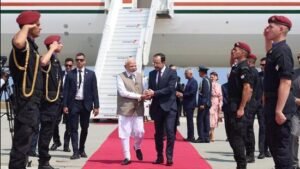
Prime Minister Narendra Modi arrived in Cyprus
Introduction
On June 15, 2025, Prime Minister Narendra Modi arrived in Cyprus, marking the first visit by an Indian Prime Minister to the island nation in 23 years. He was warmly welcomed by Cypriot President Nikos Christodoulides at Larnaca Airport. This visit holds significant strategic, geopolitical, and diplomatic importance as Cyprus is not only a key Mediterranean nation but also Turkey’s regional rival and the incoming President of the European Council in 2026.
This development is crucial from a CLAT Current Affairs 2026 perspective, especially for aspirants preparing through the best online coaching for CLAT, as it blends international relations, trade policy, regional geopolitics, and strategic diplomacy.
Why in News?
- PM Modi becomes the first Indian PM since Atal Bihari Vajpayee (2002) to visit Cyprus.
- Cyprus is India’s strategic partner in the EU and the Mediterranean.
- Visit seen as a signal to Turkey, which opposes India on Kashmir and supports Pakistan.
- Cyprus will hold the rotating presidency of the European Union (EU) in 2026, enhancing its influence in EU policymaking.
- India is aiming to build bridges with Europe, especially post-Operation Sindoor and global shifts in supply chains.
Point-Wise Summary for CLAT 2026
- Historical Significance
- PM Modi’s visit to Cyprus is the first in over two decades, marking a revival of India-Cyprus diplomatic engagements.
- It highlights India’s focus on expanding global alliances in the Mediterranean and Europe.
- Geopolitical Message
- Cyprus and Turkey have long-standing territorial disputes. Turkey invaded northern Cyprus in 1974 and supports the Turkish Republic of Northern Cyprus, which is not internationally recognized.
- Cyprus opposes Turkey’s support to Pakistan on Kashmir and cross-border terrorism.
- PM Modi’s visit sends a clear message to Ankara that India is strengthening ties with Turkey’s rival.
- Countering the Islamabad-Ankara Axis
- Turkey has aligned with Pakistan on Kashmir in recent years.
- India’s outreach to Cyprus is part of its efforts to neutralize anti-India blocs, especially in multilateral forums like the United Nations.
- Energy and Trade Cooperation
- Cyprus is key to India’s energy diversification strategy due to its natural gas reserves in the Mediterranean.
- The visit is expected to see discussions on trade, investment, digital connectivity, and energy cooperation.
- EU Presidency and India’s Diplomacy
- Cyprus will preside over the EU Council in 2026.
- India sees Cyprus as a partner to strengthen its outreach to the EU, especially in light of strategic technology, cybersecurity, and digital trade talks.
- Green Line and Buffer Zone
- PM Modi’s visit may include a symbolic stop at the Green Line, the UN buffer zone that separates north and south Cyprus.
- This would act as a response to Turkey’s military presence and political interference in the region.
- Middle East & India-MEC Corridor
- Cyprus is also part of the wider Mediterranean network under India’s India-Middle East-Europe Economic Corridor (IMEC).
- IMEC, announced at the G20 Summit in India, aims to counter China’s Belt and Road Initiative and link Indian ports with Europe via the Gulf.
- Operation Sindoor Diplomacy
- The choice of Cyprus as the first stop after Operation Sindoor, which saw India rescue nationals from global conflict zones, underscores India’s push for secure and friendly global partnerships.
- G7 Summit Alignment
- PM Modi will visit Canada and Croatia next as part of a 3-nation tour.
- Cyprus visit precedes Modi’s arrival at the G7 Summit, where supply chains, digital governance, and Israel-Iran conflict discussions are on the agenda.
- India’s New Global Alignment
- The visit is a continuation of India’s post-Operation Sindoor diplomatic strategy—focusing on like-minded democracies, economic diversification, and strategic autonomy.
Notes and Key Terms for CLAT Aspirants
Term | Explanation |
Cyprus | An eastern Mediterranean country divided between a Greek Cypriot south and Turkish-occupied north since 1974. |
Green Line | The UN-controlled buffer zone dividing Cyprus into the Republic of Cyprus and the Turkish-occupied north. |
Operation Sindoor | India’s recent evacuation mission for stranded citizens in West Asia, showing India’s global emergency response. |
EU Presidency (Rotating) | Each EU member state holds the presidency of the Council of the EU for 6 months on a rotating basis. |
India-Middle East-Europe Corridor (IMEC) | A strategic economic corridor proposed to counter China’s Belt and Road Initiative (BRI). |
UNSC Reforms | India’s push for reform in the United Nations Security Council to include itself as a permanent member. |
Why Cyprus Matters – Explained for CLAT GK
- Cyprus supports India’s stance on Kashmir, countering Pakistan-Turkey alignment.
- The country is EU-aligned, and its future presidency provides India a diplomatic channel to the European Union.
- Cyprus offers natural gas, giving India strategic leverage in the energy sector.
- With global realignment post-COVID and Ukraine conflict, India needs new allies beyond traditional superpowers.
Legal and Strategic Relevance for CLAT 2026
- International diplomacy and strategic visits like this are often tested in CLAT Current Affairs and GK sections.
- Cyprus is linked to various legal disputes under international law (Turkey’s occupation, buffer zone, EU law, UN resolutions).
- India’s foreign policy impacts trade law, security law, energy law, and international humanitarian law—topics with increasing relevance in legal education.
- Understanding the intersection of law and diplomacy is essential for future lawyers, diplomats, and policy-makers.
Broader Foreign Policy Themes
- India is actively building alliances to strengthen its presence in Europe, West Asia, and the Mediterranean.
- Engagement with Cyprus, Canada, and Croatia showcases India’s multipolar foreign policy approach.
- The visit adds momentum to India’s global leadership ambitions, already visible in G20, BRICS, QUAD, and Indo-Pacific strategies.
Important Takeaways for CLAT MCQs
- Who was the last Indian PM to visit Cyprus before Modi?
→ Atal Bihari Vajpayee (2002) - Which country does Cyprus have territorial disputes with?
→ Turkey - Which year will Cyprus hold the EU Council Presidency?
→ 2026 - What corridor is Cyprus part of in India’s strategic vision?
→ India-Middle East-Europe Economic Corridor (IMEC) - What is the Green Line in Cyprus?
→ The UN-controlled buffer zone between North and South Cyprus
Conclusion
Prime Minister Modi’s landmark visit to Cyprus is more than just a diplomatic handshake—it is a strategic move that reinforces India’s presence in Europe, the Mediterranean, and global policy circles. By engaging with Cyprus, a natural rival of Turkey and future EU chair, India sends a clear message of regional assertion and global ambition.
For students preparing with the best online coaching for CLAT, this event blends legal diplomacy, international relations, economic corridors, and constitutional principles—all core to the evolving landscape of law and governance in the 21st century.






